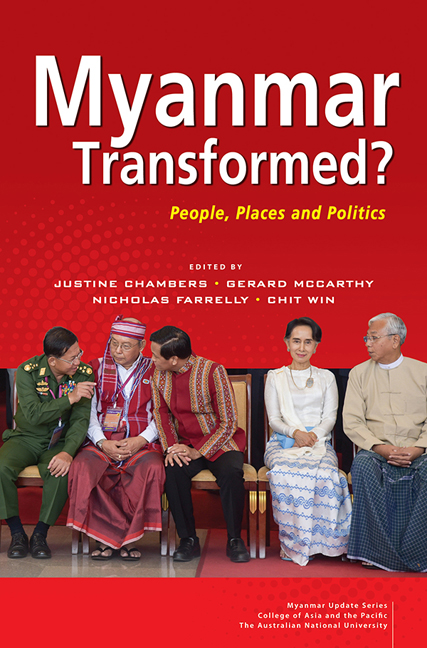Book contents
- Frontmatter
- Contents
- List of Tables
- List of Figuress
- Acknowledgements
- Contributors and Editors
- Part I Introduction
- Part II People
- Part III Places
- Part IV Politics
- 9 Partnership in Politics: The Tatmadaw and the NLD in Myanmar since 2016
- 10 From Ceasefire to Dialogue: The Problem of “All-Inclusiveness” in Myanmar's Stalled Peace Process
- 11 Securitization of the Rohingya in Myanmar
- 12 Forming an Inclusive National Identity in Myanmar: Voices of Mon People
- Part V Epilogue
- Abbreviations and Key Terms
- Index
11 - Securitization of the Rohingya in Myanmar
from Part IV - Politics
Published online by Cambridge University Press: 12 February 2019
- Frontmatter
- Contents
- List of Tables
- List of Figuress
- Acknowledgements
- Contributors and Editors
- Part I Introduction
- Part II People
- Part III Places
- Part IV Politics
- 9 Partnership in Politics: The Tatmadaw and the NLD in Myanmar since 2016
- 10 From Ceasefire to Dialogue: The Problem of “All-Inclusiveness” in Myanmar's Stalled Peace Process
- 11 Securitization of the Rohingya in Myanmar
- 12 Forming an Inclusive National Identity in Myanmar: Voices of Mon People
- Part V Epilogue
- Abbreviations and Key Terms
- Index
Summary
In the last five years the Rohingya community has been subject to renewed waves of anti-Muslim propaganda and accompanying violence, killings and systematic marginalization that aim both to permanently disenfranchise and to displace them from their native land. The relaxation of media restrictions alongside the ongoing political liberalization in Myanmar has exacerbated this situation. The brutal “clearance operations” inflicted upon the Rohingya community in 2017 saw more than 750,000 people flee across the border to Bangladesh amidst reports of extrajudicial killings, sexual violence and arson by Myanmar's state military Tatmadaw. While the United Nations has declared this to be a “textbook example of ethnic cleansing” (UNOHCHR 2017a), the attacks on government targets have validated many Myanmar citizens’ long held belief that the Rohingya pose a threat to their nation and an existential threat to Buddhism, the majority religion.
As a result of the attacks on border police posts by the Aarakan Rohingya Salvation Army (ARSA) in October 2016 and August 2017, widespread misinformation and propaganda has inflated the threat of “terrorism”, fuelling Myanmar people's sense of insecurity and mistrust towards the Rohingya people. Part of this attitude is embedded in the colonial experience (1824–1948), and the view that Rohingya people came to Rakhine State under the British from neighbouring Bangladesh to address labour shortages on agricultural plantations. In line with global events, people in Myanmar also see the latest string of attacks from ARSA as part of a wider phenomenon of global terrorism taking root in many parts of the world. However, the situation now facing the Rohingya is located in a much more complex history of violence and the ongoing securitization of their community by Myanmar's successive military dictators.
So why has the Rohingya problem become so intractable? This paper explores how people's attitudes to recent events in Rakhine State builds off decades of systemic persecution and institutionalized discrimination of the Rohingya on the pretext of threats to national sovereignty. This article draws on recent literature which describes the way Muslims, and the Rohingya in particular, have been constructed as “other” in Myanmar (Gravers 2015; Nyi Nyi Kyaw 2016; Schissler et al. 2017). In this article I advance this argument, demonstrating how over time successive governments in Myanmar have securitized the Rohingya community based on a narrative of the Rohingya as a foreign “enemy other” and an existential threat to state and society.
- Type
- Chapter
- Information
- Myanmar Transformed?People, Places and Politics, pp. 251 - 276Publisher: ISEAS–Yusof Ishak InstitutePrint publication year: 2018



